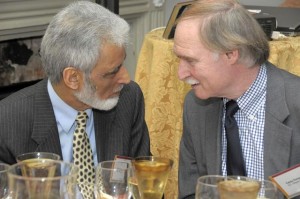Sayyid Syeed Works for Religious Tolerance
November 10, 2009
Washington, DC
Nidal Malik Hasan, the U.S. army officer who allegedly killed 13 people and wounded 31 others at Fort Hood military base in Texas Nov.5, is a devout Muslim. American Islamic organizations expressed shock and condemnation of what they called, “the senseless and appalling act of violence,” and offered condolences and prayers to the victims and their families.
Among the groups speaking out is the Islamic Society of North America, or ISNA, the largest Muslim-American organization in the western hemisphere. Sayyid Syeed, the group’s national director, is the focus of this week’s American Profile.
Sayyid Syeed’s work at ISNA reflects his lifelong campaign to promote tolerance and non-violence, and to bring people of different faiths together in productive dialogue.
Syeed drew inspiration from a childhood meeting with Gandhi
Sayyid Syeed grew up in Kashmir, a mountainous region of the Indian subcontinent where Hindus and Muslims once lived in peace. All that changed after India’s independence from Britain and the creation of a predominantly Muslim Pakistan in 1947. Frictions between the two religious communities and their rival claims to Kashmir erupted into violence.
In 1947, Syeed’s father took him to a meeting with Mahatma Gandhi, India’s beloved champion of non-violent social change, during the Hindu leader’s only trip to Kashmir. Syeed, then just six years old, remembers the meeting vividly.
“Mahatma Gandhi was so pained to see what was happening in India and Pakistan. And he said, ‘Look to Kashmir and see a ray of hope, and I hope that the role of Kashmir will be to promote peace and understanding in the subcontinent.’ Mahatma Gandhi’s statement and the appreciation of the role of Muslims in Kashmir was sort of the inspiration for me,” Syeed says.
Syeed formed the first North American campus group for Muslim students
Sayyid Syeed came to the U.S. in 1974, one of thousands of Muslim students then flocking to the West in pursuit of higher education and advanced degrees. But Syeed already had a keen sense of his life’s mission which was to advocate for tolerance and inter-religious harmony through peaceful dialogue. He became active organizing newly-arrived Muslim students and he founded the first Muslim Student Association in the U.S. and Canada.
In 1984, after earning his Ph.D. in socio-linguistics and becoming a U.S. citizen, Syeed helped engineer the transformation of the Muslim student group into the Islamic Society of North America.
“From the very beginning, our whole program was in a sense, an interfaith program. Many of the activities that we had, whether it was Friday prayers or our Sunday schools, we started from the generous offers given to us by people of other faiths,” Syeed says.
The interfaith dialogues included Baptists, Catholics and Protestants. But the major breakthrough, Syeed says, was with the Jewish community.
“With the Jewish community, the problem was the issue of Israel and Palestine. We told our Jewish leaders and friends that it is very critical that the Muslim community in America, which is growing, and the Jewish community should be brought closer so that they can appreciate and respect each other,” he recalls.
Staying determined to building bridges between faiths
Syeed says that his efforts to involve Muslim Americans in interfaith dialogues paid off in the aftermath of the terrorist attacks of September 11, 2001.
“It is amazing how our colleagues from other faiths were equally disturbed and upset about this extremist misrepresentation of Islam. So that gives us confidence that darkness can be fought by knowledge and education,” Syeed says.
He adds the 9/11 attacks created deep suspicions among non-Muslim Americans, but they also gave American Muslims new incentives to work with other faiths to dispel their misconceptions about Islam, and to recognize what he calls the “common legacy” of all faiths.
“It took us some time and it will take more time to invite people of other faiths to the commonalities with Islam, the common message of these Abrahamic faiths [which is] to help everybody understand that all of us are monotheists, all of us are coming from an Abrahamic faith, and we have so much common legacy,” Syeed says.
Today, he reflects, much work remains to be done to address the hatred, bigotry and ignorance that still divide communities of faith, and that still spark bloody conflicts around the world, including in his own native Kashmir. He plans to continue his lifelong mission as a leader and a teacher, promoting a peaceful role for Islam and helping to bridge the gulf between America and the Muslim world.


















